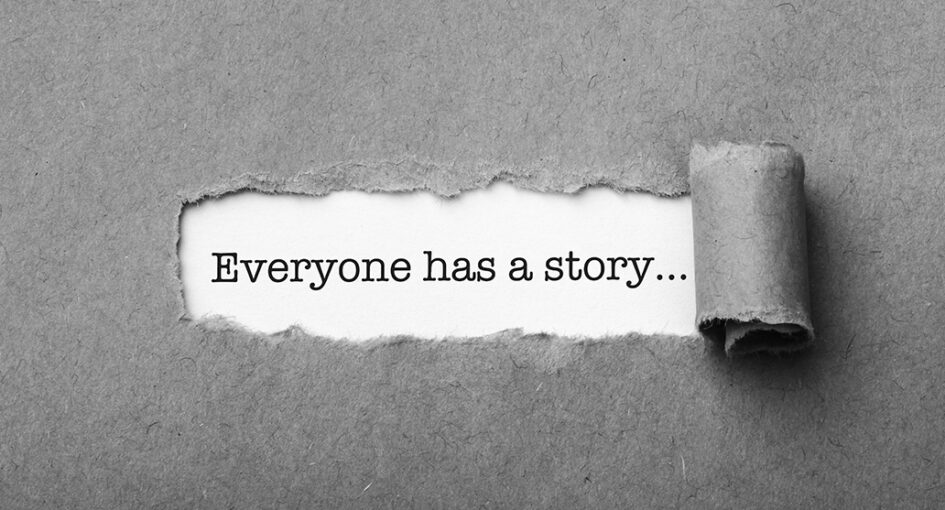
Businesses need to know how to develop a brand story because if marketing was as simple as just saying, “Buy my thing click here,” we would all be Jeff Bezos. In reality, however, consumers need to know why they should trust you with their money. You need to give them a reason to believe.
You need to tell them a story, and not just any story. Here’s everything you need to know to understand how to develop a brand story for your company that audiences will remember.
What is a brand story? That’s a good question. If you take a quick look at Google search results, the common answer is that a brand story is a summary of everything from your company’s history to its values, all wrapped up in a bow with a narrative structure.
But that makes brand storytelling less interesting—and effective—than it can be. That description doesn’t take your consumer into account at all, and if you don’t consider your audience in your approach to marketing, how can your reach or resonate with them?
So when asked, “What is a brand story?” we say it’s the key brand element that tells consumers how your product fits into their lives and solves a problem they need to address so they can achieve a goal, feel fulfilled, or otherwise improve their lives.
In other words, brand stories are key to thoughtful, human-centered marketing.
Now that you can answer “what is a brand story,” here’s how to develop a brand story that centers on your audience while showcasing your company’s value proposition and making you unforgettable in consumers’ minds.
We’ve been talking a lot about your audience, and we’ll get there. But before you put yourself out in the world with a website, ads—anything—you should have a clear idea of why you’re in business to begin with. Why you do business is different from the what you provide or who you are as a team. This is key to brand development overall, and you can learn more about it here.
After you understand your company’s reason for being, start to understand why your audience would seek you out. More than their age and gender, your team needs to take time to understand their interests, their mindset—if possible, where they are emotionally when they realize they need your help. This holistic, psychographic (as opposed to purely demographic) research is important; it’s the root of all great creative brand marketing. It’s also not an exact science. If handling your branding work yourself, you can approximate your audience’s general mindset with some good-old-fashioned Google sleuthing. However, if you want to go more in-depth and need support, think about hiring an experienced brand marketing agency who has the resources to help you get to the core of what makes your audiences tick.
The customer journey isn’t that different from the classic hero’s journey that intellectual Joseph Campbell said most myths and modern stories use as a template: the story’s hero has a problem. They go on an adventure to fix it. They face an ordeal along the way, but they see how to solve their problem and eventually return from their adventure with an elixir (the solution to the issue they’ve been facing the whole time).
With this in mind, try making your brand story not about you. Instead, make your consumer the hero. When you do that, you position your product or service as the answer to their needs. This kind of creative brand marketing story also demonstrates that you understand what your audience needs, which can help you earn consumers’ credibility and trust.
Now that you know the basics of how to develop a brand story, how can it help you once it’s done? In simple terms, you should use it to influence all of the content your brand creates.
From an organic (unpaid) perspective, this means using your narrative to:
And when creating paid content, you can use your brand story to:
These are all worthwhile steps to take to achieve successful creative brand marketing. That said, doing all this can be time consuming. When everyone on your team is investing copious time and effort, it can also be difficult to view the brand as it really is with objectivity. The individual goals that each of your colleagues works against every day can create a different perception of what makes your company important, or which parts of the business are crucial to satisfying your audience.
If you intend to embark on developing your brand story in-house, be aware that these biases can unintentionally creep into your team’s decision making.
However, you can avoid that, get a fresh set of eyes, and gain the support of an entire team of experts when you decide to do this type of project with an experienced brand marketing agency. The right ones take the time to help you discover your why, approach your audiences’ needs with curiosity and sensitivity, and put the two together to deliver brand marketing that converts while always staying authentic to what your company stands for.
Looking for an experienced brand marketing agency to provide that level of partnership for you? Then contact Mascola Group, the agency that is Marketing with Integrity, and let’s find out what kind of story we’ll tell together.